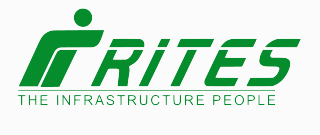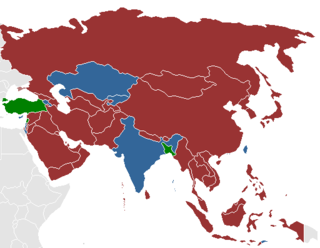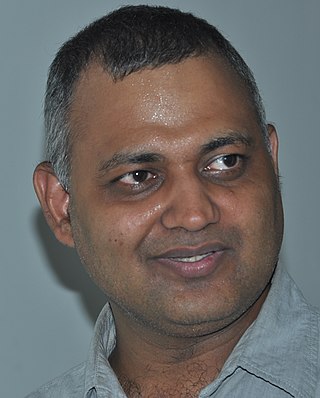
Anglo-Indian people fall into three different groups: people of mixed-race origin with Indian and British ancestry, people of unmixed Indian descent born or living in the United Kingdom, and people of unmixed British descent born or living in India. The latter sense is now mostly historical. People fitting the middle definition are more usually known as British Asian or British Indian. This article focuses primarily on the modern definition, a distinct minority community of mixed-race Eurasian ancestry, whose first language is ordinarily English.

Terrorism in India, according to the Home Ministry, poses a significant threat to the people of India. Compared to other countries, India faces a wide range of terror groups. Terrorism found in India includes Islamic terrorism, ultranationalist terrorism, and left-wing terrorism India is one of the countries most impacted by terrorism.

RITES Ltd, formerly known as Rail India Technical and Economic Service Limited, is a Navaratna central public sector undertaking under India's Ministry of Railways. It was incorporated on April 26, 1974, and is a multidisciplinary engineering and consultancy organization providing a comprehensive range of services from concept to commissioning in all facets of transport infrastructure and related technologies.

Prostitution is legal in India, but a number of related activities including soliciting, kerb crawling, owning or managing a brothel, prostitution in a hotel, child prostitution, pimping and pandering are illegal. There are, however, many brothels illegally operating in Indian cities including Mumbai, Delhi, Kolkata, Pune, and Nagpur, among others. UNAIDS estimate there were 657,829 prostitutes in the country as of 2016. Other unofficial estimates have calculated India has roughly 3 million prostitutes. India is widely regarded as having one of the world's largest commercial sex industry. It has emerged as a global hub of sex tourism, attracting sex tourists from wealthy countries. The sex industry in India is a multi-billion dollar one, and one of the fastest growing.

Since its independence in 1947, India has accepted various groups of refugees from neighbouring countries, including partition refugees from former British Indian territories that now constitute Pakistan and Bangladesh, Tibetan refugees that arrived in 1959, Chakma refugees from present day Bangladesh in early 1960s, other Bangladeshi refugees in 1965 and 1971, Sri Lankan Tamil refugees from the 1980s and most recently Rohingya refugees from Myanmar. In 1992, India was seen to be hosting 400,000 refugees from eight countries. According to records with the Union Ministry of Home Affairs, as on January 1,2021, there were 58,843 Sri Lankan refugees staying in 108 refugee camps in Tamil Nadu and 54 in Odisha and 72,312 Tibetan refugees have been living in India.
Illegal immigration is the migration of people into a country in violation of that country's immigration laws, or the continuous residence in a country without the legal right to. Illegal immigration tends to be financially upward, from poorer to richer countries. Illegal residence in another country creates the risk of detention, deportation, and/or other sanctions.
Ethnic relations in India have historically been complex. India is ethnically diverse, with more than 2,000 different ethnic groups. There is also significant diversity within regions, and almost every state and several districts has its own distinct mixture of ethnicities, traditions, and culture. Throughout the history of India, ethnic relations have been both positive and negative.
Organised crime in Nigeria includes activities by fraudsters, bandits, drug traffickers and racketeers, which have spread across Western Africa. Nigerian criminal gangs rose to prominence in the 1980s, owing much to the globalisation of the world's economies and the high level of lawlessness and corruption in the country.
Indian Mujahideen (IM) is an Islamist terrorist group which has been particularly active in India. The jihadist group was founded as an offshoot of the Students' Islamic Movement of India (SIMI) by several radicalized members including Iqbal Bhatkal, Riyaz Bhatkal, Yasin Bhatkal, Abdul Subhan Qureshi, Amir Reza Khan and Sadiq Israr Sheikh, among others. It has been active since at least 2005 when it bombed the Dashashwamedh Ghat in Varanasi. It carried out several serial-bombings in Indian cities in the following years notably the 2007 Uttar Pradesh bombings, 2008 Jaipur bombings, 2008 Ahmedabad bombings, 2008 Delhi bombings, 2010 Pune bombing, 2011 Mumbai bombings, 2011 Delhi bombing, 2013 Patna bombings, 2013 Hyderabad blasts and the 2013 Bodh Gaya bombings.
The 13 September 2008 Delhi bombings were a series of five synchronised bomb blasts that took place within a span of few minutes on Saturday, 13 September 2008 at various locations in Delhi, India. The first bomb exploded at 18:07 IST, and four other blasts followed in succession, with at least 20 people killed and over 90 injured.

India's LGBTQ culture has recently progressed in its cities due to the growing acceptance of the LGBTQ community in urban India in the 21st century.

In July 2012, violence in the Indian state of Assam broke out with riots between indigenous Bodos and Bengali Muslims in the Bodoland region of North East, India. The first incident was reported to have taken place on 20 July 2012. At least 108 people died and over 400,000 people were displaced into 270 relief camps, after being displaced from almost 400 villages. Eleven people have been reported missing.

Delhi Queer Pride Parade is organised by members of the Delhi Queer Pride Committee every last Sunday of November since 2008. The queer pride parade is a yearly festival to honour and celebrate lesbian, gay, bisexual and transgender people, and their supporters. The parade usually runs from Barakhamba Road to Tolstoy Marg to Jantar Mantar.

Somnath Bharti is an Indian lawyer who has become a politician representing the Aam Aadmi Party (AAP). As a lawyer, he practised at the Supreme Court of India and Delhi High Court. He was elected as the AAP candidate for the Malviya Nagar constituency in the 2013 Delhi state assembly elections and was Minister of Law, Tourism, Administrative Reforms, Art & Culture in the Government of Delhi, from 28 December 2013 to 14 February 2014, at which time the AAP government resigned. He has served as MLA from Malviya Nagar Constituency from February 2015 - February 2020. He served as Chairman, Committee on Privileges of Delhi Legislative Assembly for the year 2016–17. On 10 August 2018, Delhi Legislative Assembly appointed him as chairman, Committee to examine the Stray Dog and Monkey Menace in Delhi. He won the 2020 Delhi Elections by 18,144 votes. By Delhi Legislative Assembly he was appointed Chairman, Public Accounts Committee, Chairman, House Committee on Violation of Protocol Norms and Contemptuous Behaviour By Government Officers with MLAs, Members of Standing Committee on Education and Committee on Govt Undertakings.

In 2015, hundreds of thousands of Rohingya people were forcibly displaced from their villages and IDP camps in Rakhine State, Myanmar, due to sectarian violence. Nearly one million fled to neighbouring Bangladesh and some travelled to Southeast Asian countries including Malaysia, Indonesia, Cambodia, Laos and Thailand by rickety boats via the waters of the Strait of Malacca, Bay of Bengal and the Andaman Sea.
An illegal immigrant in India is a foreigner who has entered India either without valid documents or who initially had a valid document, but has overstayed beyond the permitted time, as per the general provisions of the Citizenship Act as amended in 2003. Such persons are not eligible for citizenship by registration or naturalisation. They are also liable to be imprisoned for 2–8 years and fined.

Lesbian, gay, bisexual and transgender (LGBT) people in Kerala face legal and social difficulties not experienced by non-LGBT persons. However, Kerala has been at the forefront of LGBT issues in India after Tamil Nadu. It became one of the first states in India to establish a welfare policy for the transgender community and in 2016, proposed implementing free gender affirmation surgery through government hospitals. Same-sex sexual activity has been legal since 2018, following the Supreme Court ruling in Navtej Singh Johar v. Union of India. In addition, numerous LGBT-related events have been held across Kerala, including in Kochi and Thiruvananthapuram. However, there is also increasing opposition to LGBT rights recently as evidenced by the anti-LGBT campaigns spearheaded by meninist groups and Muslim organisations like Indian Union Muslim League, Samastha and Jamaat-e-Islami.
Cattle theft, more commonly cattle raiding or cattle lifting, is a property crime in India. In the ancient and medieval era India texts, stealing cattle is described as a crime and sin, a motif that appears in Hindu mythologies.
The Citizenship (Amendment) Act, 2019 (CAA) was passed by the Parliament of India on 11 December 2019. It amended the Citizenship Act, 1955 by providing an accelerated pathway to Indian citizenship for persecuted religious minorities from Afghanistan, Bangladesh and Pakistan who arrived in India by 2014. The eligible minorities were stated as Hindus, Sikhs, Buddhists, Jains, Parsis or Christians. The law does not grant such eligibility to Muslims from these countries. The act was the first time that religion had been overtly used as a criterion for citizenship under Indian law, and it attracted global criticism.

The Citizenship Amendment Act (Bill) protests, also known as the CAA Protest, CAB Protest or CAA and NRC protests, occurred after the Citizenship Amendment Act (CAA) was enacted by the Government of India on 12 December 2019. The move sparked a widespread national and overseas ongoing protests against the act and its associated proposals of the National Register of Citizens (NRC). The protests first began in Assam and spread swiftly in other states such as Delhi, Meghalaya, Arunachal Pradesh, and Tripura on 4 December 2019. Protests broke out rapidly across the country, although the concerns of the protesters vary.












